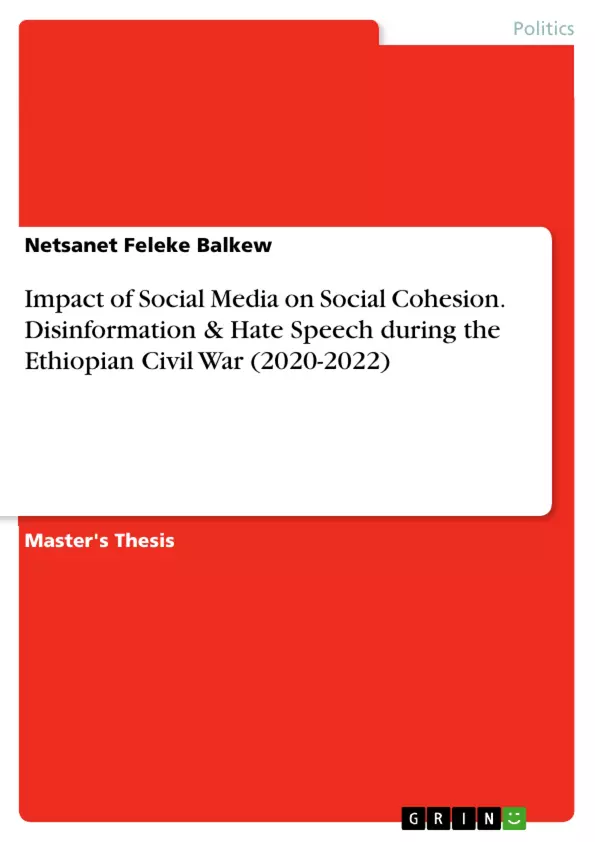The Ethiopian civil war 2020-2022 underscores the profound impact of social media on social cohesion, with platforms like Facebook and Twitter significantly shaping narratives and public discourse. This study delves into how the spread of disinformation and hate speech on social media has intensified ethnic tensions and eroded trust within communities. By conducting a comprehensive literature review and employing qualitative methods such as content analysis and stakeholder interviews, the research investigates the role of these platforms in expanding divisions and escalating conflict. It identifies predominant narratives that fuel polarization and highlights the critical need for robust content moderation and regulatory frameworks. The study emphasizes the importance of multi-stakeholder collaboration, involving policymakers, social media companies, civil society, and international organizations, to address the adverse effects of social media. Effective management of social media's influence in contemporary conflicts requires balancing freedom of expression with the prevention of harmful content.
Inhaltsverzeichnis (Table of Contents)
- CHAPTER ONE: INTRODUCTION
- Background of the study
- Statement of research problem
- Objectives of the study
- General objective
- Specific objectives
- Research questions
- Scope of the study
- Significance of the study
- Limitation of the study
- Organization of the study
- CHAPTER TWO: REVIEW OF RELATED LITERATURE
- Definition and concept of social media
- The role of social media
- Social media influence during conflict
- Disinformation
- Definition
- Social media disinformation
- The impact of disinformation
- Response to disinformation
- Hate Speech
- Definition
- Social media Hate Speech
- The impact of Hate Speech
- Response to Hate Speech
- Social Cohesion
- The Nexus of social media and social cohesion
- The Nexus of hate speech and social cohesion
- The nexus of disinformation and social cohesion
- Social Media's Impact on Conflict Dynamics and Social Cohesion
- Trends of Social Media Disinformation and Hate Speech in Ethiopia
- Theoretical Framework
- CHAPTER THREE: RESEARCH DESIGN AND METHOD
- Introduction
- Philosophical Foundation
- Methodology
- Research Design
- Sampling
- Data Sources and collection tools
- Data analysis and Interpretation
- Ethical Considerations
- CHAPTER FOUR: DATA PRESENTATION AND ANALYSIS
- Background of the Conflict
- Understanding Social Media Dynamics
- Predominant Narratives and Themes
- Disseminating Disinformation
- Disseminating Hate Speech
- Regulatory Challenges and Responses
- Implications for Social Cohesion
- Undermining Social Cohesion
- Immediate Humanitarian Concerns
- Erosion of Trust
- Undermine National Unity & Social Harmony
- Implication of Peace-building Efforts
- Hindrance to Peace-Building Efforts
- Inclusive Dialogue and Participation
- Findings
Zielsetzung und Themenschwerpunkte (Objectives and Key Themes)
This study aims to investigate the impact of social media on social cohesion in Ethiopia during the 2020-2022 civil war, focusing on the roles of disinformation and hate speech. The research explores the dynamics of information dissemination, regulatory responses, and the consequences for peacebuilding efforts.
- The role of social media in shaping narratives and influencing public opinion during conflict.
- The spread of disinformation and hate speech on social media platforms and their impact on social cohesion.
- The challenges faced by Ethiopian authorities in regulating social media content and mitigating the spread of harmful information.
- The implications of social media dynamics for peacebuilding and reconciliation efforts.
- The relationship between social media use, the spread of misinformation and hate speech, and the erosion of trust in institutions.
Zusammenfassung der Kapitel (Chapter Summaries)
Chapter One: Introduction lays the groundwork for the study, outlining the research problem, objectives, and methodology. Chapter Two: Review of Related Literature provides a comprehensive overview of existing scholarship on social media, disinformation, hate speech, and social cohesion, particularly within the context of conflict. Chapter Three: Research Design and Method details the research approach, including the philosophical foundation, methodology, sampling techniques, and data collection methods used in the study. Chapter Four: Data Presentation and Analysis presents the findings from the research, focusing on social media dynamics, the spread of disinformation and hate speech, and their impact on social cohesion in Ethiopia during the 2020-2022 civil war.
Schlüsselwörter (Keywords)
Social media, social cohesion, disinformation, hate speech, Ethiopian civil war, conflict, peacebuilding, regulation, online narratives, information dissemination, humanitarian concerns, national unity.
- Quote paper
- Netsanet Feleke Balkew (Author), 2024, Impact of Social Media on Social Cohesion. Disinformation & Hate Speech during the Ethiopian Civil War (2020-2022), Munich, GRIN Verlag, https://www.grin.com/document/1501781



